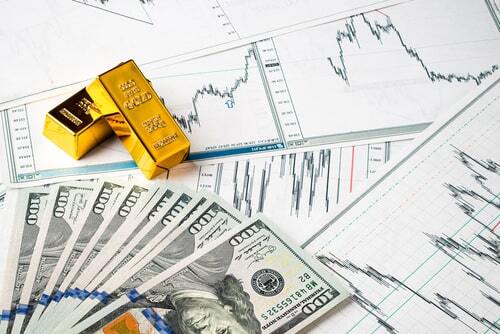
A massive destruction of wealth is coming, this is what the Fed is 'engineering' – Alfonso Peccatiello
Attempting to slow down the economy and subdue inflation, the Federal Reserve has already raised interest rates by 25 basis points and is expected to raise rates by 50 basis points at each of its next two meetings in May and June.
"Right now, the wealth effect still dominates the way we engineer economic growth to make sure the balance sheets of consumers become stronger. As asset prices keep going up, consumers' liabilities, debt and leverage get cheaper," explained Alfonso Peccatiello, Author of The Macro Compass. "If equity or housing prices drop by 50%, it will be a destruction of wealth generated by two generations, because of this loss of wealth effect. Nobody wants to see this happen."
Peccatiello spoke to David Lin, Anchor at Kitco News about his views on wealth, markets, and the Federal Reserve. Paccatiello worked as a portfolio manager for a multibillion-dollar portfolio comprised of multiple asset classes, prior to becoming an author.
Comparing the Fed's current tightening policies to policies of previous years when the Fed wanted to ease conditions, Peccatiello said they are trying to engineer an economic slowdown.
"From 2016 to 2019, the Fed was basically selling the put to the market, putting the floor on the asset prices," he noted. "Right now, the Fed is doing the opposite. They are trying to slow down the demand side of the equation in the economy. They are making your balance sheet weaker, your 401(K) go down a bit, and your second home worthless. This way demand slows down, therefore, inflation slows down."
Peccatiello discussed how high he believes the Fed will hike interest rates. "The Fed will raise rates 50 basis points in May and then again in June. They are going to hike rates until something breaks. The Fed believes neutral rates are between 2 and 2.5%, which means they can easily hike all the way to 2.5% without much happening," Peccatiello predicted. "If the economy can handle 2.5%, and the labor market remains solid, and the equity market remains buoyant, then the Fed is going to keep raising rates fast. But that assumption is just a fairytale."
On equities, Peccatiello disclosed he shorts the S&P 500, which is his main trade, and tech stocks. "My target is for the S&P to drop below 4,000 in the next two months. The reason for this target is because the Fed has been explicit about wanting financial conditions to tighten," Peccatiello emphasized. "If you look at the financial condition index; equity markets, real interest rates, credit spreads, mortgage rates and the dollar are all tightening."
Peccatiello explained why there's very little positive macro-economic news to find at this stage. "Things must get worse, unfortunately, before they get better. The big picture is that central banks won't aggregate demand to slow down. When we start seeing more signs that growth is slowing down, and or when the equity markets start to drop more aggressively, it will get worse. 4,000 for the S&P will ring some bells for the Fed," he said. "If growth slows down, it will imply that inflation will also slow down as a result. If that happens the Fed will feel more comfortable slowing down their hawkish stance."
Speaking about the real estate market, Peccatiello pointed out that it is the biggest and most leveraged asset class out there. "People should pay attention to it. The real estate market is huge, almost a $300 trillion market cap. It's much larger than the equity market, at a $100 trillion cap, or the bond market," he stressed. "Housing prices sit on the asset side of the balance sheet of consumers. Real estate prices are of paramount importance for the wealth effect. If housing prices go down, then consumers appetite to spend will also drop."
"The housing market could face a 50% slowdown. Despite all the rumors you hear about all cash buyers, 85% of all home purchases are bought with mortgages. Mortgage rates have gone up massively. 30-year mortgages in the U.S. have risen from 3% to 5%," Peccatiello stated.
"Wages have not changed for most Americans and most people around the world. And housing prices compared to last year have gone up 20%. In order to buy the same house a year ago, you must pay 30% higher in your monthly mortgage payments, which means you can't afford it."
Peccatiello advises investors to be defensive in this macro environment we are facing.
"Investors should raise their cash allocation. I know it feels uncomfortable with this spot inflation levels. It's better to be defensive than to be offensive where the macro environment doesn't allow you to be offensive," he continued. "You just must be patient. This is an environment where you have nowhere to hide. You can't buy stocks, you can't buy gold, you can't buy Bitcoin."
For more on Alfonso Peccatiello's views on wealth, markets and the Federal Reserve, please watch the full video above.
By Kitco News
For Kitco News
Time to buy Gold and Silver on the dips
Tim Moseley
